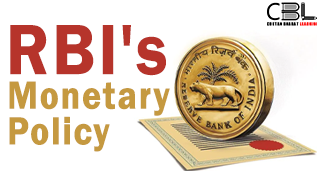RBI's Monetary Policy
Policy Repo Rate Increased by 50 basis points
What is in the News ?
- The Monetary Policy Committee (MPC) of the Reserve Bank of India (RBI) on September 30, 2022, increased the policy repo rate by 50 basis points (bps) to 5.9% making loans expensive.
-
The MPC also lowered the growth projection of FY23 from 7.2% to 7%.
-
Growth for the second quarter has been projected at 6.3%, for the third quarter at 4.6%, for the fourth quarter at 4.6%, and 7.2% for the first quarter of the next financial year.
-
The inflation projection for FY has been retained at 6.7%. While the projection for the second quarter is 7.1%, the projection for the third quarter and fourth quarter is 6.5% and 5.8% respectively. For the first quarter of the next financial year, inflation has been projected at 5%.
Why Calibrated Withdrawal of Monetary Accommodation ?
- Persistence of high inflation.
- Anchoring of inflationary expectations.
- Contain second-round effects of inflation.
- This action will support medium-term growth prospects as it will contain high inflation, thereby removing factors that dampen demand.
- Extreme depreciating pressure on Rupee to aggressive actions and commentary by central banks of Advanced Economies (AEs).
Other Comments Made by the RBI :
- The world has witnessed two major shocks — the COVID-19 pandemic and the conflict in Ukraine.
- “As if that was not enough, now we are in the midst of a third major shock — a storm — arising from aggressive monetary policy actions and even more aggressive communication from Advanced Economy (AE) central banks,” RBI Governor said.
- “The necessity of such actions is driven by their domestic considerations, but in a highly integrated global financial system, they inevitably cause negative externalities through global spillovers,” he added.
- He said the recent sharp rate hikes and forward guidance about further big rate hikes have caused tightening of financial conditions, extreme volatility and risk aversion.
- “All segments of the financial market including equity, bond, and currency markets are in turmoil across countries. There is nervousness in financial markets with potential consequences for the real economy and financial stability. The global economy is in the eye of a new storm,” he said.
- Despite this unsettling global environment, Mr. Das said the Indian economy continues to be resilient. “There is macroeconomic stability. The financial system remains intact, with improved performance parameters,” he said.
